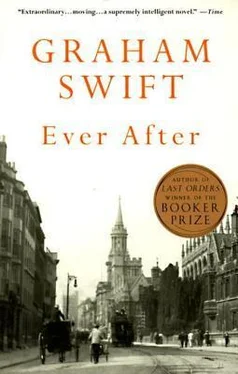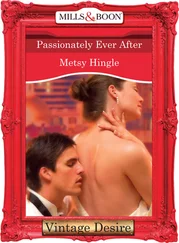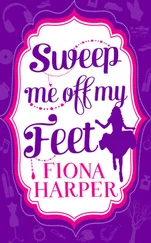The way things begin. The auguries of happy-ever-afters. A clockmaker’s shop, where time ticks impartially away. Perhaps Matthew was aware that this first encounter with his wife-to-be had been engineered by his father and was the work of a witting or unwitting match-making by the two elder parties. But what did this matter, when he could be unswervingly sure that if he had met Elizabeth in some other circumstance, wholly free of behind-the-scenes manoeuvring and wholly subject to chance, he would have experienced the same thrilling emotion of a foregone conclusion?
Call it — heaven-sent.
A sober scrutiny might have judged that a man who had lost his mother when he was small, and remembered her most clearly as the woman who had read to him from the Bible, might well be drawn to a clergyman’s daughter; and that in that bumbling, kindly figure of Rector Hunt (the way his hand had touched hers) he saw something his own father could not offer. But this would have been to ignore the young man of only twenty-five, who, for all his, by now, increasing and debilitating proneness to thought, still possessed, in spite of himself, a healthy animal nature. He falls in love, heavily, thickly, thankfully (is there any other way?). He is still — thank God — open to experience. He sees himself, indeed, as “saved”—returned to the sweet, palpable goodness of the world.
He goes back into the workshop with his father and is strangely, tenderly struck by his familiar presence. The way his leather apron and his eye-glass seem to wait for him; the way the brass components on the bench have an almost sentient, obedient distinctness. Things fit, things have a purpose.
That evening, his steps light and every breath fresh and clear, Matthew strolls down from his father’s house to the knoll at the edge of town on which stand the ruins of the castle. Once, his mother used to take him on this same walk, and used to tell him, like some made-up tale to warn impudent young boys, how men, wicked men, had once been hanged in public right here on the castle green. The air is soft and aglow. A breeze caresses the peaceful curves of the landscape, and Matthew is prompted by that old urge, that old itch in the palm — as if he were capable, now, of such a giant reach. Perhaps he need never tell her — better never to tell her — about his “thoughts.” Let them be banished like demons.
“The little hills rejoice …” The land of the living.
He watches a buzzard hang over the hillside, then drop from its shelf of air. He looks eastwards across the valley, where the Tamar severs Cornwall from Devon, and is struck by the pleasing notion that, like the best lovers of old, he and Elizabeth dwell on different sides of a divide.
Meanwhile, Elizabeth, riding home to Burlford in the carriage with her father, displays a tendency to pensive, absorbed silence. Several times the Rector ventures to strike a conversation, but then, with perhaps a smile to himself, thinks better of it.
I invent all this. I don’t know that this is how it happened. It can’t have been like this simply because I imagine it so.
That night, in the White Hart, there would have been a bloom about his son’s features — more than could be ascribed to an evening’s stroll — which John Pearce would have been too shrewd not to see the cause of. Just as he was too shrewd to dwell, for the time being, on the Rector’s visit earlier that day. But, calling for another brandy and water, and knowing full well that Burlford was only three miles from Tavistock, he would have chosen his moment and said, “Now, about old Makepeace. What do you say?”
Romantic love. A made-up thing. A concoction of the poets. Jack shall have Jill. Amor vincit omnia .
Her last role was Cleopatra. Love triumphant and transcendent. Love beyond the grave: “I am again for Cydnus to meet Mark Antony.” This was at Stratford, two summers ago. Then the symptoms made their appearance, and it had to be announced that because of sudden illness she could no longer perform. Early the next year she was dead.…
But you could say I was always a stage-widower. A stage-cuckold. The old joke about the actress’s husband: he could never get his hands on his wife’s parts. I would watch my wife go away. I would watch her disappear and turn into — these other people. With my own eyes I witnessed the inconstancy. How many times did I watch Ruth fall into another man’s embrace? Play seductress and seducee? Run squealing, half naked, round strange bedrooms? How many times did I watch her — die? And it is true that, sitting in the darkness (proud, jealous, enthralled), I would have to concede that at such moments she didn’t belong to me, she belonged to her audiences. She was everybody’s. But the thing is, she would always come back to me. Me. I don’t know why, but she did. Always. A dullness for her brightness? A nobody for her somebody? When you are out on an adventure …
I see her at the end of the garden of our cottage in Sussex, which backed on to a field that dipped down to a wood, with the Downs rising beyond. Against that backdrop, she would pace to and fro by the low, bramble-smothered fence, a book or script in one hand, gesticulating to the air, communing with invisible interlocutors, utterly bound up in herself, so that she would be unaware even of me, a privileged audience of one, watching from the window. Turning and turning again, wearing a path in the grass, now and then clawing a hand through her hair or hugging herself with both arms or offering up some half-conscious commentary on her progress — a “Now then, let’s see” or a “Fuck it! Who wrote this thing?!”—and all the time lighting cigarette after cigarette from the pack jammed in her cleavage, chucking the butts away at random (once starting a small fire in the brambles). It was at such times, rather than in the darkness of theatres, that the truth of something would come to me: that people are fuel. They are consumed. Some, for some reason, more quickly, more brightly, more readily than others. But they are burnt, used. Fuel, fire, ash.
I think she knew. I think she knew all along, even before the outward symptoms appeared. But didn’t want to spoil — not before she had to — that Cleopatra summer. What you don’t know can’t hurt you. One Sunday, that September, we drove out, with G— (an actor), to a pub we knew, somewhere in the depths of Warwickshire. A day of sweet, cidery sunshine. G— was in a strangely deferential, vaguely timid mood. If I told you who G— was, you would guess that this was not his usual style. We sat outside. She wore dark glasses and nobody recognised her. I went to get the drinks, and when I emerged, G— was kissing Ruth on the crown of the head. His own dark glasses — these incogniti —pushed up on to his brow, a hand on Ruth’s shoulder, his lips in her hair.
It wasn’t what you think. No, it wasn’t what you think. It was only the thought of the possibility . It could have been them, you see; it could have been Ruth and G— all along, not Ruth and me. Them, not us. I stood there in the doorway with the drinks, like someone standing outside their life, like someone suddenly without a life. You see, it was a solemn, intense, decorous kiss. Like a kiss of farewell, like the kiss of a priest. Like the kiss you give to the small, hard head of a child, conscious of its vulnerability, the brittleness of the skull. And I knew then, by the chill inside me, despite that soft sunshine, by the feeling that my body was like an empty sack, that she was going to die.
And her first role was Girl Number Three.
It was after her father’s death, some fifteen years ago, that I gave up my career (my blooming career as a third-rate academic) to become her “manager.” All sorts of questionable motives might be ascribed to this — and perhaps were at the time. That I wished to be more at my wife’s side — in order, that is, to keep an eye on her. That I wanted to live off her earnings. In any case, it was a bogus job. Other people — agents, theatre and film people— “managed” Ruth. I was no more than a privileged secretary-cum-minder. Since my talents were limited, I sometimes hindered rather than helped proceedings. But I would still maintain that I did it out of a desire to protect her.
Читать дальше












